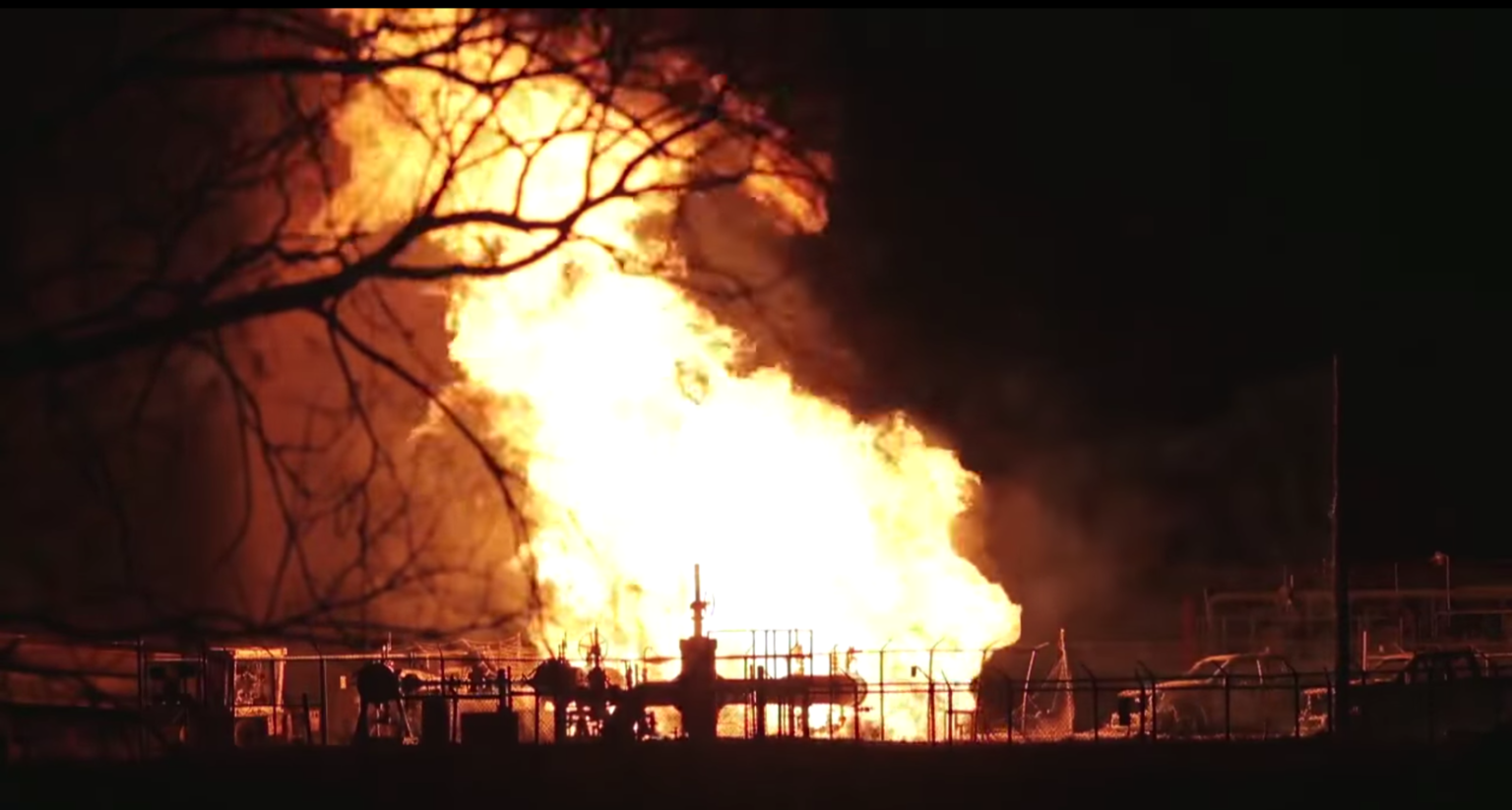The day after the U.S. Army Corps of Engineers gave the owners of the Dakota Access Pipeline (DAPL) the final permit it needed to build its line across Lake Oahe, which connects to the Missouri River, a natural gas liquids pipeline owned by one of the DAPL co-owners exploded and erupted in flames in Paradis, Louisiana. Paradis is located 22 miles away from New Orleans.
That line, the VP Pipeline/EP Pipeline, was purchased from Chevron in August 2016 by DAPL co-owner Phillips 66. One employee of Phillips 66 is presumed dead as a result of the explosion and two were injured.
In a press release published by Phillips 66 announcing its purchase of VP/EP, the company stated that “approximately 200 miles of regulated pipelines that carry raw NGLs from a third-party natural gas processing plant.” A DeSmog investigation shows that the “third-party natural gas processing plant” is owned by the company Targa Resources, and that plant is fed in part by a gas pipeline owned by Enbridge, another co-owner of Dakota Access.
Merchant of Venice
The Targa Resources plant is also known as the VESCO facility, with VESCO shorthand for the Venice Energy Services Company, located in Venice, Louisiana.
“Through the Partnership’s 76.8% ownership interest in Venice Energy Services Company, L.L.C., [Targa] operates the Venice gas plant…and the Venice Gathering System (‘VGS‘) that is approximately 150 miles in length,” explains Targa’s 2016 U.S. Securities and Exchange Commission Annual Report. “VESCO receives unprocessed gas directly or indirectly from seven offshore pipelines and gas gathering systems including the VGS system. VGS gathers natural gas from the shallow waters of the eastern Gulf of Mexico and supplies the VESCO gas plant.”
Enterprise Product Partners and ONEOK serve as co-owners of VESCO. Among the seven pipelines connected to VESCO, one is owned by Enbridge, the Mississippi Canyon Gas Line. That Line feeds gas extracted from the Gulf of Mexico via two offshore wells owned by Shell, as well as other companies, according to Enbridge’s website.
Targa’s Venice Gathering System is fed by Gulf of Mexico offshore gas drilled by Chevron, Apache Corporation and other companies, according to the Venice Gathering System website. VP Pipeline/EP Pipeline is part of what is known as the Texaco Expanded NGL Distribution System (TENDS), which Phillips 66 has acquired and renamed the River Parish NGL System.
“The $70 million TENDS project is an important element in TNGI‘s South Louisiana strategy embracing growth and development of new business,” Texaco, since purchased by Chevron, said in a 1997 press release. “TENDS consists of a network of pipelines capable of transporting a combined maximum of 230,000 barrels of product each day to numerous refineries and petrochemical complexes across South Louisiana.”
According to Reuters, VP Pipeline/EP Pipeline carries a natural gas liquid mix known as “y-grade.”
“After being extracted in the field, mixed NGLs, sometimes referred to as ‘Y-grade’ or ‘raw NGL mix,’ are typically transported to a centralized facility for fractionation where the mixed NGLs are separated into discrete NGL products: ethane, ethane-propane mix, propane, normal butane, iso-butane and natural gasoline,” states Targa’s website of the mix.
Aging Pipelines
The New Orleans Advocate reported that VP Pipeline/EP Pipeline opened for business originally as a pipeline in 1958. Like the line that connects to Dakota Access, the Energy Transfer Crude Oil Pipeline (ETCOP), it is decades old.
Built in 1947, ETCOP will carry the oil obtained from hydraulic fracturing (“fracking”) via North Dakota’s Bakken Shale basin from Patoka, Illinois to Nederland, Texas. ETCOP was formerly known as the Trunkline Pipeline, which carried gas from south to north.
Aging pipelines are seen as a major issue that could create catastrophes like those seen in Paradis, where the fire lasted for days until officials finally got it under control. The 2013 ExxonMobil-owned Pegasus Pipeline spill in Mayflower, Arkansas, which saw 3,190 barrels (134,000 gallons) spew out of the line, ensued on an aging pipeline constructed between 1947-1948.
“About 55% of the 135,000 miles of oil and gasoline pipelines in the U.S. was installed in 1969 or earlier, according to government data,” reported CNN in September. “That’s before current safety regulations were in effect, Many are still cast iron pipes.”
The BlueGreen Alliance, a collaborative of U.S. labor unions and environmental organizations, has pushed for aging pipelines to be repaired as part of a broad employment program. They called the effort the Repairing Our Cities’ Aging Pipelines initiative, or RECAP.
Image Credit: The Times-Picayune’s NOLA.com, YouTube screenshot
Subscribe to our newsletter
Stay up to date with DeSmog news and alerts







